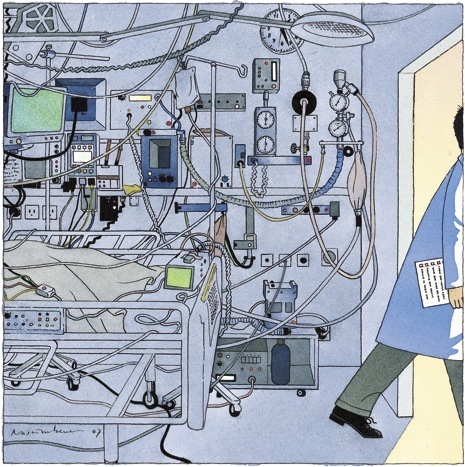There was a link in Joel's recent Five whys post that I found to be a fascinating read: A New Yorker article called The Checklist.
This got me thinking about how (and if) technology could facilitate the Checklist. The requirements aren’t really very high-tech:
The checklists provided two main benefits, Pronovost observed. First, they helped with memory recall, especially with mundane matters that are easily overlooked in patients undergoing more drastic events. … A second effect was to make explicit the minimum, expected steps in complex processes.
Dr. Pronovost’s efforts were successful because he was able to identify a single well focused process that ended up having a significant ROI. Within the complex workings of an ICU, the checklist ensured minimal compliance.
Point of care computing is ready-made for this type of task, and has many obvious advantages over a paper-based system. As the article points out, even with its dramatic results and minimal cost, adoption is slow. One reason may be:
…where I.C.U. nurses and doctors are in short supply, pressed for time, overwhelmed with patients, and hardly receptive to the idea of filling out yet another piece of paper?
In reality though, the problem isn’t the piece of paper, and technology will also not improve the situation much. I think Dr. Pronovost hits the nail on the head with this statement (my highlight):
The fundamental problem with the quality of American medicine is that we’ve failed to view delivery of health care as a science. The tasks of medical science fall into three buckets. One is understanding disease biology. One is finding effective therapies. And one is insuring those therapies are delivered effectively. That third bucket has been almost totally ignored by research funders, government, and academia.
Well said.
UPDATE (2/11/08):
See: HIStalk Interviews Peter Pronovost MD PhD, Johns Hopkins University.
Dr. Pronovost's reaction to HSS Office for Human Research Protection deciding that the "list method" was unethical and that the program had to stop: "Shocked." No duh! Also, the discussion regarding the increased error rates associated with computerized physician order entry (CPOE) is great -- yet another call for standardization.
UPDATE (2/29/08):
Just ran across this: The Checklist Saga: Victory! It seems that OHRP had a change of heart after all. It's great news when common sense (a.k.a. sanity) prevail!
